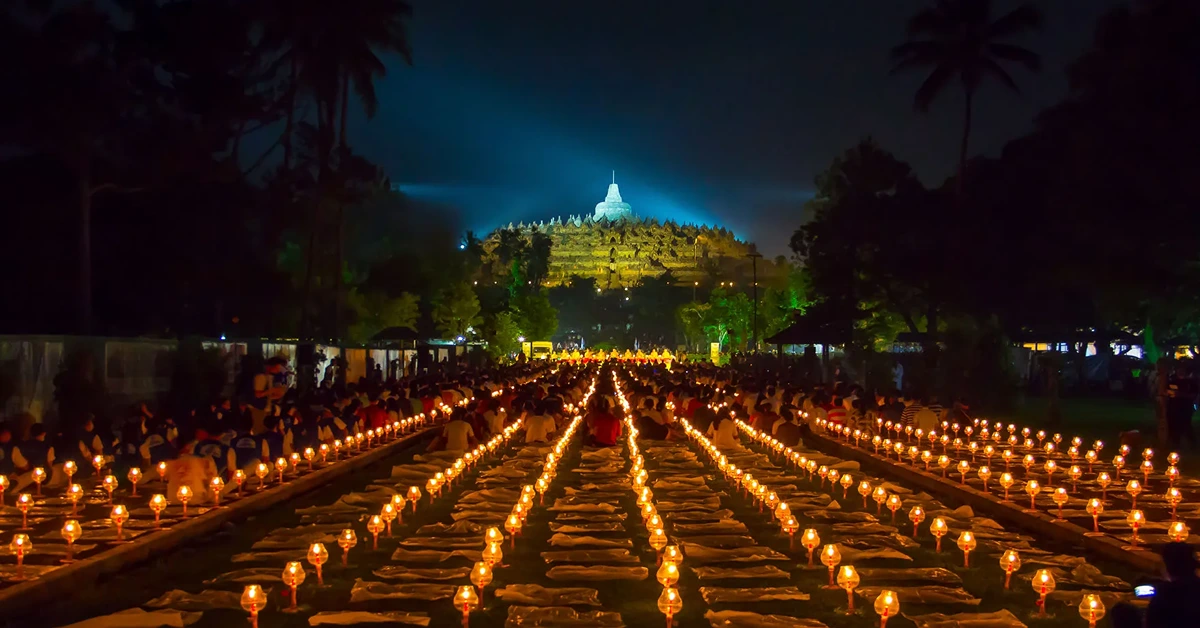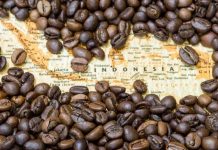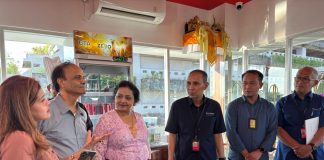Every year, Buddhists commemorate Waisak Day. Waisak is a moment to remember three sacred events in the life of Gautama Buddha, namely the birth, attainment of perfect enlightenment and death of the Buddha. Waisak Day 2025 falls on Monday, 12 May 2025/ 2569 BE and has been declared a national holiday.
Waisak is often referred to as the Tri Suci Waisak. Tri Suci Waisak is a holy day celebrated by all Buddhists in the world to celebrate three important events, namely the birth of Prince Siddharta (the future Buddha) in Lumbini Park in 623 BC (BC), Prince Siddharta achieved great enlightenment and became Buddha in Buddha Gaya (Bodh Gaya) at the age of 35 years in 588 BC, then Gautama Buddha parinibbana (died) in Kusinara at the age of 80 years in 543 BC.
On this day, the Buddha resisted all of the temptations of the world and was enlightened by the truth. He finally received the truth that will ease human suffering in the form of the Ten Great Virtues: Charity, Morality, Renunciation, Wisdom, Effort, Patience, Truth, Determination, Universal Love and Equanimity. Later on, he will also discover the Four Noble Truths and the Noble Eightfold Path.
Even if Waisak is only celebrated by 1% of the population, it is a national holiday in which everyone in Indonesia joins in to celebrate the occasion. The experience of Waisak will be different in Indonesia as it is celebrated with a hint of local culture.
Here are the most popular Waisak celebrations in Indonesia, each one different from the rest:
1. Api Dharma Mrapen in Grobogan
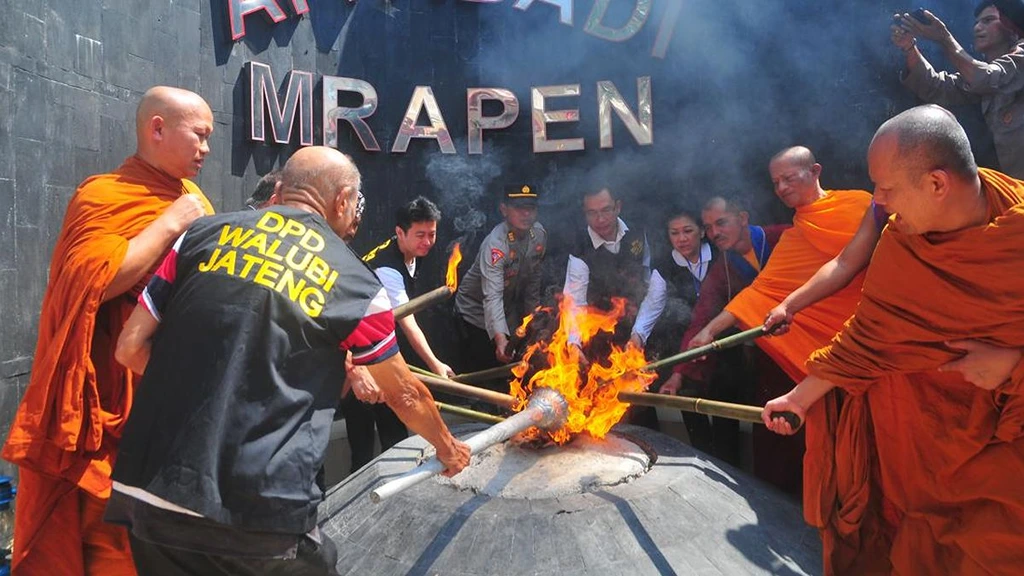
Before the celebration on Waisak , there is a ritual of taking the Dharma Mrapen Fire in Grobogan, Central Java. The Mrapen Dharma Fire is an eternal fire that comes from nature. It is called eternal, because this fire continues to burn from the ground and never goes out even if it rains. The fire symbolizes the radiance of light in the darkness for all people who carry out the dharma and makes the heart bright, calm, and attains purity. Then, the Mrapen Dharma Fire departed from Grobogan to Mendut Temple in Magelang, where it is sacred.
2. Air Berkah Umbul in Jumprit, Temanggung
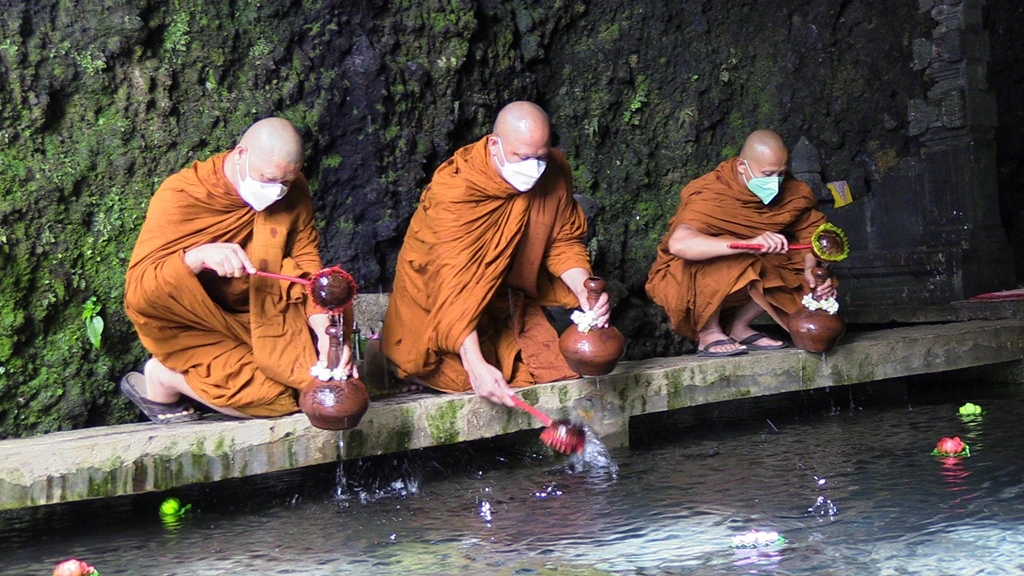
Apart from the Mrapen Dharma Fire, Buddhists also hold a ritual to collect the Tri Suci Waisak Blessing Water in Umbul Jumprit, Parakan, Temanggung, Central Java. This ritual was attended by a number of Buddhist religious leaders. Collecting the Tri Suci Waisak Blessing Water means that the mind becomes like water that radiates purity and calm at all times. It is believed that a clear and pure mind will give rise to universal love and give rise to thoughts of infinite wisdom. Similar to the Mrapen Dharma Fire, the Blessing Water is sent from Umbul Jumprit to Mendut Temple, where it is then sacred.
3. Mendut Temple in Magelang
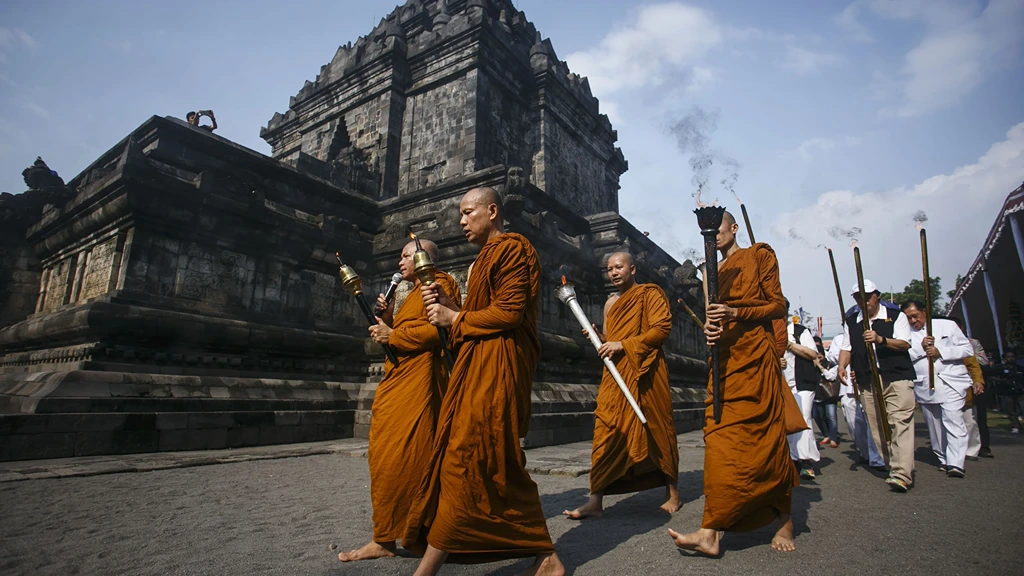
The Waisak celebration ritual at Mendut Temple is still in the same series as Borobudur Temple. Mendut Temple is the sacred location for the Mrapen Dharma Fire and Umbul Jumprit Blessing Water. Later, the Dharma Fire and the Blessing Water will be paraded or carnivaled from Mendut Temple to Borobudur Temple. One the eve of Waisak , Buddhists guided by monks and nuns will recite the sacred chants and the great sutras while carrying the tools of worship such as the replica of the Buddha, blessed water, fire of Dharma and the Tripitaka scriptures to Borobudur temple. After prayers, lanterns will flow to signify happiness and, in the hope, that it will enlighten the whole world and that their prayers will come true. The carnival procession, which was attended by thousands of Buddhists, was the culmination of the Tri Suci Vesak commemoration.
4. Trisuci Waisak in Borobudur Temple, Magelang
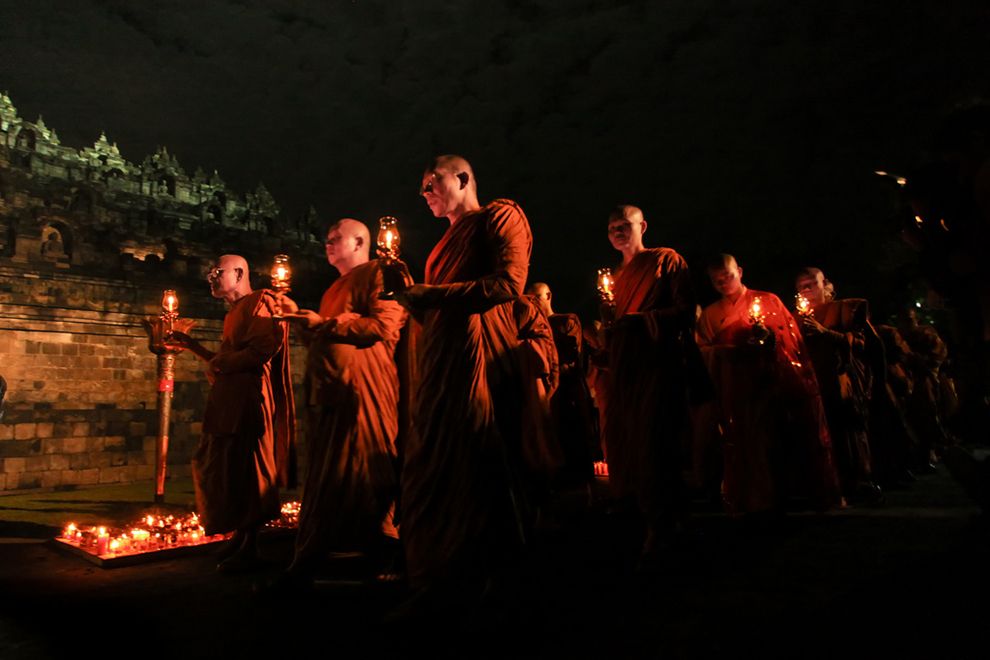
In 2024, Borobudur Temple in Magelang Regency, Central Java, will again become the center of the 2568 BE National Waisak Tri Sacred Celebration. Borobudur temple, is not only recorded as one of UNESCO’s World Heritage Site, but also the largest temple in the world. Buddhists from all over the world usually arrive at Borobudur ahead of Waisak to complete the ritual.
National Waisak Events at Borobudur
The National Waisak theme in 2024 is ‘To Live Happily As Creatures and Human Beings, Let Us Raise the Consciousness Taught by the Buddha, with the sub-theme Avoid Worldly Greed, Ignorance, Anger and Hatred’.
The following is a series of National Waisak events at Borobudur in 2024:
• 5 May 2024: Community Service for Heroes’ Cemetery throughout Indonesia.
• 17 May 2024 – 23 May 2024: there are a series of activities that will be held at Borobudur Temple and its surroundings.
• 17 May 2024: free medical social service patient screening at the GVA Mendut Vihara.
• 18 May 2024 – 19 May 2024: an opening ceremony for social service in the form of free medical treatment at Lumbini Park Zone 2 Borobudur Temple.
• 20 May 2024: there is a reception for Bhikkhu Thudong arriving at Borobudur Temple
• 21 May 2024: taking the Dharma Fire in Mrapen, Grobogan and the sacred ritual at Mendut Temple, There is also the second day of the Indonesian Nyingma Monlam Chenmo at Aksobya Park, Borobudur Temple, followed by the siding of the Siddhi full moon lamp on the Progo River, morning prayer at Borobudur Temple and devotional puja and evening meditation at Borobudur Temple.
• 22 May 2024: procession to collect blessed water at Umbul Jumprit, Temanggung and sacred ritual at Mendut Temple.
Apart from that, there is Atthasila at the GVA Mendut Vihara, morning prayers at Borobudur Temple, almsgiving in the grounds of Mendut Temple, 3rd Borobudur Peace & Prosperity Festival at Aksobya Park at Borobudur Temple and evening devotional puja and meditation at Borobudur Temple.
5. Kirab Agung Amisa Puja in Yogyakarta
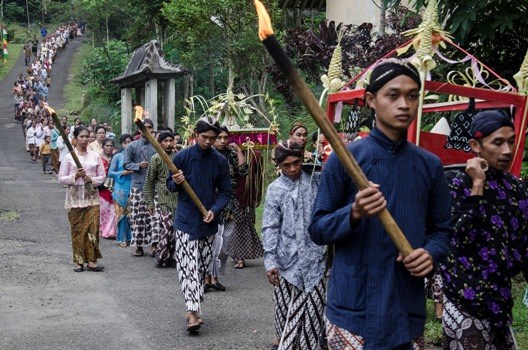
In Yogyakarta, Buddhists celebrate Waisak through the grand carnival of Kirab Agung Amisa Puja. This parade is held with the statue of Buddha and citizens using traditional Javanese garb. By wearing Javanese traditional clothes, the community also signifies unity with the culture in that area. The entourage will also carry various sesajen that includes nasi tumpeng, Waisak water and fire which will be buried in the courtyard of the Giriloka Vihara. After the carnival, Buddhists will perform puja bakti (prayers) and read the sacred paritta (sacred book) of Waisak until the end of Waisak. Finally, the occasion will be closed with the celebration of darma sakti. The implementation of the Amisa Puja Grand Carnival aims to commemorate the teachings of the Great Teacher Gautama Buddha.
6. Bahal Temple in North Sumatra
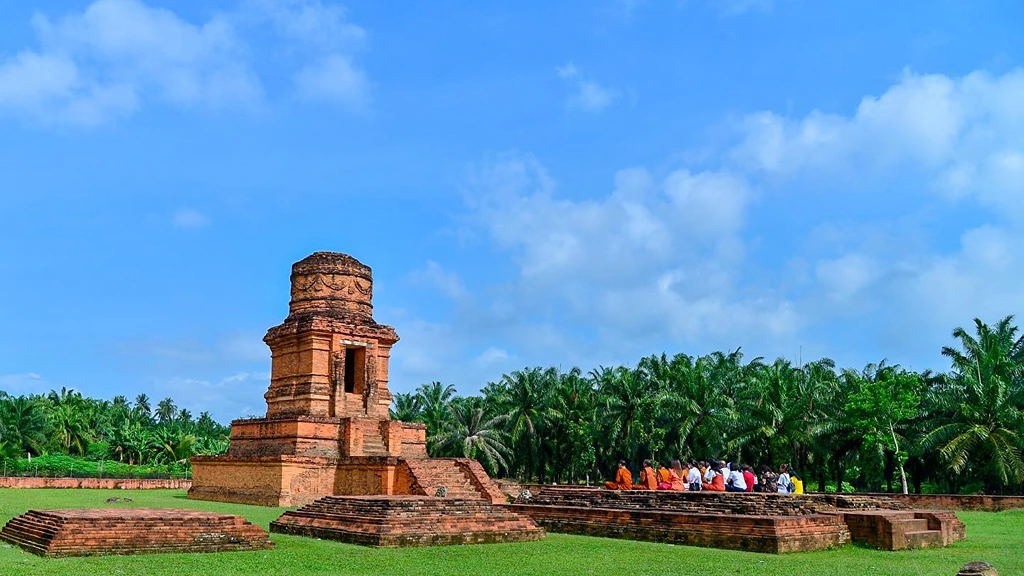
Waisak celebrations, apart from being centered nationally at Borobudur Temple, are also held in other places, such as in North Sumatra. The location is Bahal Temple, in Bahal Village, Portibi District, North Padang Lawas Regency, North Sumatra. In 2023, the Vesak Day Celebration will be held at Bahal 1 Temple, known as Biaro. For your information, Bahal Temple is the largest temple complex in North Sumatra. There are three temples in this complex, including Bahal I Temple, Bahal II Temple, and Bahal III Temple, each of which is separated by a distance of about 500 meters.
7. Waisak Parade in Pekanbaru

Similar to Yogyakarta, Pekanbaru also has a parade to celebrate Waisak. In this parade, many people included symbols of Buddhism and perform puja (ritual for prayers). Prayers in this march are made in the hopes that Indonesia is always blessed by God Almighty, the Buddha, and the gods. There are also influences of Chinese culture such as Barong sai, dragon attractions, and cars decorated with Buddha statues and colorful lights. This march is considered one of the ways to honor Buddha.
8. Muara Temple Festival in Jambi
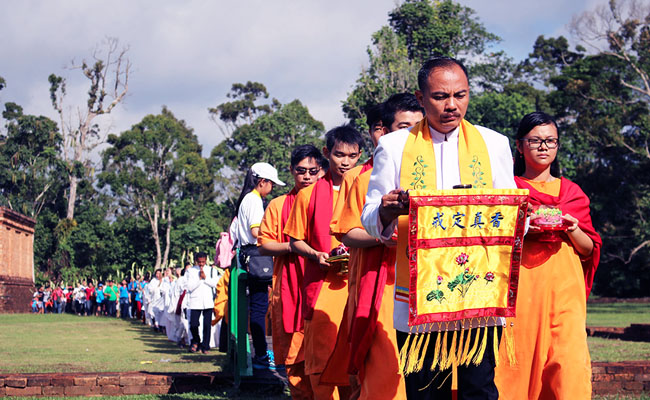
After Waisak celebrations in Borobudur, Waisak Celebration in Muara Temple is the second largest celebration. It is usually held in the Muara Jambi temple complex. The ritual starts with Buddhists circling the temple complex and praying, in which they end with the meditative prayer led by the monk. After the ritual is over, Buddhists will finally release lanterns in the early hours. Interestingly, this religious celebration is always held in conjunction with the Muara Jambi Temple Festival which serves art performances, band festivals and culinary bazaars.
9. Metta Arama Buddhist Temple in Menteng, Central Jakarta
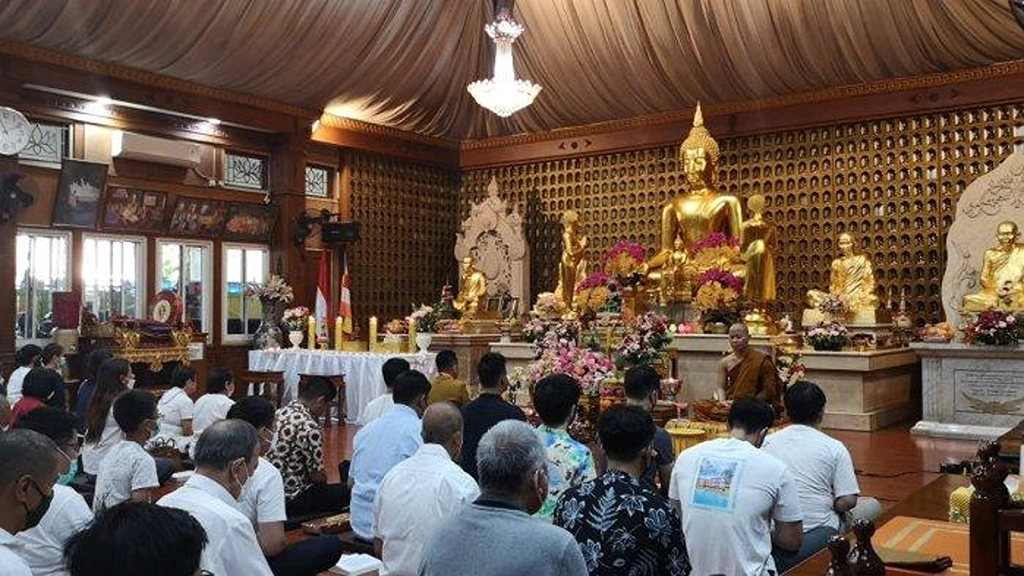
Another place to celebrate Waisak is the Metta Arama Buddhist Vihara which is located on Jalan Lankan Lembang Blok D Number 59, Menteng, Central Jakarta. It was recorded that in 2023, this temple became the venue for the Waisak celebration which was attended by 200 Buddhists to pray at this temple. When the Waisak puja took place, the faithful continued to arrive until they filled the courtyard behind the monastery. After reciting prayers and meditating, the congregation then listens to the Waisak message delivered by the monk.
10. Siddharta Temple in Banten
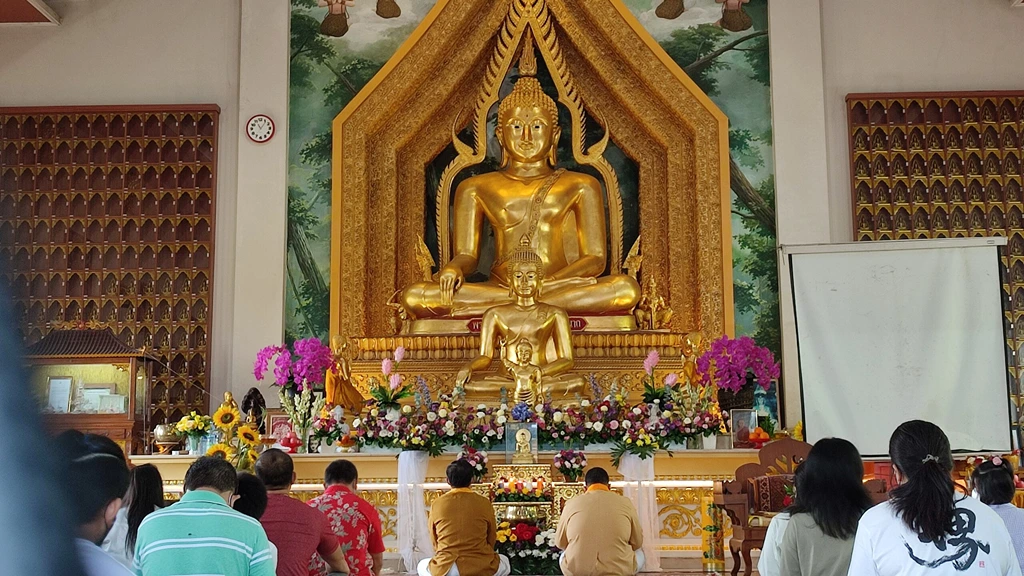
Buddhists also celebrate Waisak Day at the Siddharta Vihara on Jalan Manunggal V No. 22, Pandan Aren District, South Tangerang City, Banten. The general form of Waisak celebration is to commemorate three important events, namely the birth of Sidharta Gautama, the attainment of the great enlightenment of becoming the Buddha, and the death of Sidharta Gautama. The forms vary from devotional worship, bathing the Buddha image, Sangha Dana, chanting holy chants, sprinkling blessed water, and others. That morning prayer was part of the Tri Holy Days.
Indonesia’s condition as a country rich in culture affects the ongoing celebration of Waisak, as many Buddhists from various cultures, traditions and backgrounds unite for this occasion. For them, Waisak is a chance to strengthen and unite the minority population in various parts of Indonesia. For other Indonesians, it is an opportunity to practice acceptance and tolerance for loved ones celebrating Waisak.


